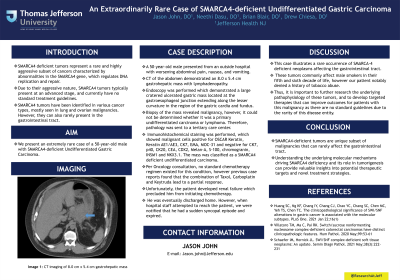Sunday Poster Session
Category: Stomach
P1360 - An Extraordinarily Rare Case of SMARCA4-Deficient Undifferentiated Gastric Carcinoma
Sunday, October 22, 2023
3:30 PM - 7:00 PM PT
Location: Exhibit Hall

Has Audio

Jason John, DO
Jefferson Health
Stratford, NJ
Presenting Author(s)
Jason John, DO1, Neethi Dasu, DO2, Brian Blair, DO1, Drew Chiesa, DO1
1Jefferson Health, Stratford, NJ; 2Jefferson Health, New Jersey, NJ
Introduction: SMARCA4 deficient tumors represent a rare and highly aggressive subset of cancers characterized by abnormalities in the SMARCA4 gene, which regulates DNA replication and repair. Due to their aggressive nature, SMARCA4 tumors typically present at an advanced stage, and currently have no standard treatment guidelines. SMARCA4 tumors have been identified in various cancer types, mostly seen in lung and ovarian malignancies. However, they can also rarely present in the gastrointestinal tract. We present an extremely rare case of a 50-year-old male with SMARCA4-deficient Undifferentiated Gastric Carcinoma.
Case Description/Methods: A 50-year-old male presented from an outside hospital with worsening abdominal pain, nausea, and vomiting. CT of the abdomen demonstrated an 8.0 x 5.4 cm gastrohepatic mass with lymphadenopathy. Endoscopy was performed which demonstrated a large cratered ulcerated gastric mass located at the gastroesophageal junction extending along the lesser curvature in the region of the gastric cardia and fundus. Biopsy of the mass revealed malignancy, however, it could not be determined whether it was a primary undifferentiated carcinoma or lymphoma. Therefore, pathology was sent to a tertiary care center. Immunohistochemical staining was performed, which showed malignant cells positive for OSCAR Keratin, Keratin AE1/AE3, CK7, EMA, MOC-31 and negative for CK7, p40, CK20, CEA, CDX2, Melan-A, S-100, chromogranin, INSM1 and NKX3.1. The mass was classified as a SMARCA4 deficient undifferentiated carcinoma. Per Oncology, no standard chemotherapy regimen existed for this condition, however previous case reports found that the combination of Taxol, Carboplatin and Keytruda lead to a partial response. Unfortunately, the patient developed renal failure which precluded him from initiating chemotherapy. He was eventually discharged home. However, when hospital staff attempted to reach the patient, we were notified that he had a sudden syncopal episode and expired.
Discussion: This case illustrates a rare occurrence of SMARCA-4 deficient neoplasms affecting the gastrointestinal tract. These tumors commonly affect male smokers in their fifth and sixth decade of life, however our patient notably denied a history of tobacco abuse. Thus, it is important to further research the underlying pathophysiology of these tumors, and to develop targeted therapies that can improve outcomes for patients with this malignancy as there are no standard guidelines due to the rarity of this disease entity.

Disclosures:
Jason John, DO1, Neethi Dasu, DO2, Brian Blair, DO1, Drew Chiesa, DO1. P1360 - An Extraordinarily Rare Case of SMARCA4-Deficient Undifferentiated Gastric Carcinoma, ACG 2023 Annual Scientific Meeting Abstracts. Vancouver, BC, Canada: American College of Gastroenterology.
1Jefferson Health, Stratford, NJ; 2Jefferson Health, New Jersey, NJ
Introduction: SMARCA4 deficient tumors represent a rare and highly aggressive subset of cancers characterized by abnormalities in the SMARCA4 gene, which regulates DNA replication and repair. Due to their aggressive nature, SMARCA4 tumors typically present at an advanced stage, and currently have no standard treatment guidelines. SMARCA4 tumors have been identified in various cancer types, mostly seen in lung and ovarian malignancies. However, they can also rarely present in the gastrointestinal tract. We present an extremely rare case of a 50-year-old male with SMARCA4-deficient Undifferentiated Gastric Carcinoma.
Case Description/Methods: A 50-year-old male presented from an outside hospital with worsening abdominal pain, nausea, and vomiting. CT of the abdomen demonstrated an 8.0 x 5.4 cm gastrohepatic mass with lymphadenopathy. Endoscopy was performed which demonstrated a large cratered ulcerated gastric mass located at the gastroesophageal junction extending along the lesser curvature in the region of the gastric cardia and fundus. Biopsy of the mass revealed malignancy, however, it could not be determined whether it was a primary undifferentiated carcinoma or lymphoma. Therefore, pathology was sent to a tertiary care center. Immunohistochemical staining was performed, which showed malignant cells positive for OSCAR Keratin, Keratin AE1/AE3, CK7, EMA, MOC-31 and negative for CK7, p40, CK20, CEA, CDX2, Melan-A, S-100, chromogranin, INSM1 and NKX3.1. The mass was classified as a SMARCA4 deficient undifferentiated carcinoma. Per Oncology, no standard chemotherapy regimen existed for this condition, however previous case reports found that the combination of Taxol, Carboplatin and Keytruda lead to a partial response. Unfortunately, the patient developed renal failure which precluded him from initiating chemotherapy. He was eventually discharged home. However, when hospital staff attempted to reach the patient, we were notified that he had a sudden syncopal episode and expired.
Discussion: This case illustrates a rare occurrence of SMARCA-4 deficient neoplasms affecting the gastrointestinal tract. These tumors commonly affect male smokers in their fifth and sixth decade of life, however our patient notably denied a history of tobacco abuse. Thus, it is important to further research the underlying pathophysiology of these tumors, and to develop targeted therapies that can improve outcomes for patients with this malignancy as there are no standard guidelines due to the rarity of this disease entity.

Figure: CT imaging of 8.0 cm x 5.4 cm gastrohepatic mass.
Disclosures:
Jason John indicated no relevant financial relationships.
Neethi Dasu indicated no relevant financial relationships.
Brian Blair indicated no relevant financial relationships.
Drew Chiesa indicated no relevant financial relationships.
Jason John, DO1, Neethi Dasu, DO2, Brian Blair, DO1, Drew Chiesa, DO1. P1360 - An Extraordinarily Rare Case of SMARCA4-Deficient Undifferentiated Gastric Carcinoma, ACG 2023 Annual Scientific Meeting Abstracts. Vancouver, BC, Canada: American College of Gastroenterology.
